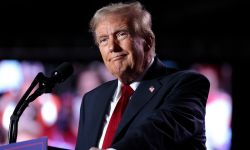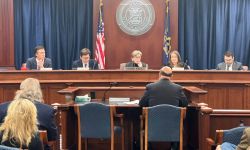Gun ban at Michigan Capitol unlikely, despite urging from Dana Nessel

LANSING — Scenes of armed demonstrators towering over lawmakers during a protest at the Michigan Capitol two weeks ago have prompted calls to ban firearms inside the historic building and thrust a little-known commission into the middle of the debate.
But Michigan Capitol Commission members, a majority of whom serve at the pleasure of leadership in the Republican-led Legislature, do not think they have legal authority to regulate firearms despite Democratic Attorney General Dana Nessel’s assertion they do.
A 2013 state law gives the unpaid, six-member commission the power to “operate and manage” the public building in Lansing. The statute does not detail that power, however, and leaves some decisions — including allocation of space within the Capitol — up to the Legislature.
- Gov. Whitmer extends Michigan coronavirus stay-at-home order to May 28
- Whitmer reopens Michigan from coronavirus in phases: What that means to you
- The latest: Michigan coronavirus map, curve, chart, updated COVID-19 news
With commissioners set to meet Monday to discuss the potential for new firearm regulations, Nessel weighed in Friday, telling them she believes they have the power to ban guns at the building and will defend them in court if they choose to do so and are sued.
Allowing protesters clad in body armor to carry loaded rifles in the Capitol, including balconies that overlook the House and Senate, during controversial legislative debates is “an absurdly dangerous situation that would cause the heart of any security expert to skip a beat,” Nessel wrote in a letter to Capitol Commission Chairman Gary Randall.
But commission member John Truscott said the panel’s power is “really limited” and it would be up to lawmakers to pass a ban.
“We maintain the Capitol. We hire the guy who runs the Capitol,” said Truscott, a Republican who served as press secretary to former Gov. John Engler.
“It’s very, very simple things like that. There is nowhere in (the law) where it says we're responsible for the safety of the occupants of the building.”
The debate follows an April 30 protest in Lansing, where a small group of armed demonstrators carried weapons inside the Capitol as lawmakers debated whether to extend Gov. Gretchen Whitmer’s emergency authority amid the coronavirus pandemic. Earlier, during an outdoor rally against Whitmer’s stay-at-home order, organizers had described some of the armed men as militia members, a civilian military force acting as their “security detail.”
Directly above me, men with rifles yelling at us. Some of my colleagues who own bullet proof vests are wearing them. I have never appreciated our Sergeants-at-Arms more than today. #mileg pic.twitter.com/voOZpPYWOs
— Senator Dayna Polehanki (@SenPolehanki) April 30, 2020
While lawmakers sat on the Senate floor, men with rifles stood in the gallery above them “yelling at us,” Sen. Dayne Polehanki, D-Livonia, said at the time. Sen. Sylvia Sanatana, D-Detroit, wore a bulletproof vest on the floor later in the day as a form of personal protection. Senate Majority Leader Mike Shirkey, R-Clarklake, said many protested safely but condemned those who used “intimidation and the threat of physical harm to stir up fear and feed rancor.”
Michigan law generally prohibits local governments from adopting firearm regulations that are more stringent than state law, which does not prohibit guns in the Capitol. But the commision is not a local unit of government, Nessel told members in her letter.
In her letter, she argued the commission can adopt rules to protect Capitol employees and citizens who visit the building, just as Michigan Supreme Court has barred firearms in state courts for years and school districts have authorized to enact their own gun policies under a 2018 state Supreme Court ruling.
“The Capitol is a place for free expression of thought and debate,” Nessel said in a statement. “But the freedom of civil discourse does not imply the right to threaten others with harm or violence. In our current environment and as the chief law enforcement officer in this state, I am gravely concerned for the safety of both our legislative members and the public at large.”
Prior to Nessel’s letter, the Michigan Capitol Commission had hired an outside attorney, Amy Shaw, to consider its ability to regulate firearms, Truscott said. Commission members are still awaiting the written analysis, but she has indicated to them that the “commission doesn’t have the authority [to ban guns.] The authority rests with the Legislature.”
The commission effectively works for the Legislature. Two of its members, House Clerk Randall and Secretary of the Senate Margaret O’Brien, work for legislative leaders. Both are former Republican lawmakers, and they in turn appoint two other members to the commission. The final two appointees are decided by the governor.
Truscott said he too is concerned by armed protesters who appeared at the Capitol during two large protests in recent weeks.
“As a Second Amendment advocate myself, there is absolutely no reason to bring a loaded rifle into the building,” he said.
Absent action by the commission, gun policy is not expected to change at the Michigan Capitol, where both openly carried firearms and concealed pistols have long been allowed for both lawmakers and the general public.
Shirkey and House Speaker Lee Chatfield, R-Levering, have each spoken at large Second Amendment rallies outside the Michigan Capitol, including an annual event where open carry advocates routinely bring their weapons into the building without incident.
“This is the people’s house, and the people’s capitol, and they have constitutional rights,” Chatfield said last week on a MIRS News podcast.
“You have to be very careful before you say you can exercise one constitutional right by coming in and protesting, but you can’t exercise another. And so I support people having the ability to exercise their constitutional rights in a responsible way, and I’m certainly not going to say anything different than that.”
However, Chatfield supports a separate rule that prohibits signs in the Michigan Capitol, which he said is “appropriate and should stay in place.”
That long-standing regulation, which has prompted criticism from First Amendment advocates, is ostensibly designed to protect the building from inadvertent damage by signs mounted on sticks, which has happened before.
Michigan is among a minority of states without any regulations on firearms in the Capitol building. Temporary rules have been enacted in rare instances, however. In 1999, for instance, House Republican leadership installed a metal detector outside the gallery amid protests over Engler’s plan to take over struggling public schools in Detroit.
Democratic lawmakers have proposed restrictions in recent years but have not gotten any legislation through a Legislature fully controlled by Republicans since 2010.
Guns are restricted in other government offices and federal buildings so should also be prohibited in the Capitol, Democratic Sens. Polehanki, Santana, Erika Geiss of Taylor and Marshall Bullock of Detroit said Friday in a joint statement calling on Capitol commissioners to “do the right thing” and enact regulations.
“The recent intimidation tactics used by protesters have been deeply disturbing, with their actions simply having gone too far,” the lawmakers said. “While we believe in and support Second Amendment rights, we also need to ensure the safety of those working in, and visiting, our Capitol Building.”
Michigan Open Carry Inc., a group that promotes open carry rights, is urging lawmakers to oppose any attempt to limit guns in the Capitol, citing what it called a “spotless safety record of people with firearms” at the building.
Nessel’s letter does not carry the weight of a formal legal opinion, said Tom Lambert, president of the open carry group.
“To me, it was something she cobbled together to try to make an argument that fit the answer she wanted,” he told Bridge. “She’s always been anti-gun. We knew that was running and we’ve known that since she got into office. That’s pretty darn clear.”
Lambert, who said he hopes to speak at the Capitol Commission meeting on Monday, does not believe members have the authority to limit guns inside the building.
Nessel’s reading would give commissioners “a heck of a lot of power to do a lot of things that I don’t think the legislature would have ever dreamed of giving them” beyond just regulating guns, he argued. “Where does it stop?”
See what new members are saying about why they donated to Bridge Michigan:
- “In order for this information to be accurate and unbiased it must be underwritten by its readers, not by special interests.” - Larry S.
- “Not many other media sources report on the topics Bridge does.” - Susan B.
- “Your journalism is outstanding and rare these days.” - Mark S.
If you want to ensure the future of nonpartisan, nonprofit Michigan journalism, please become a member today. You, too, will be asked why you donated and maybe we'll feature your quote next time!




